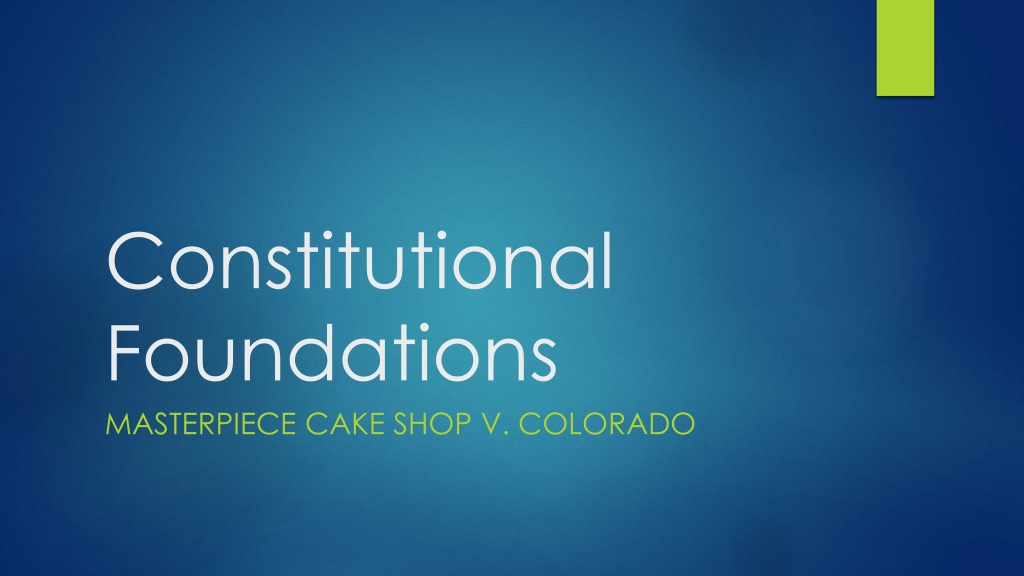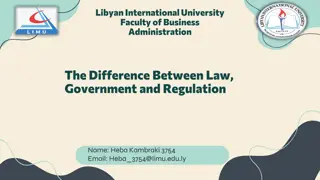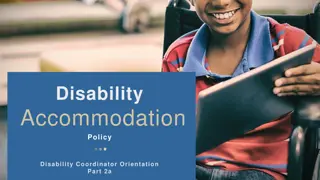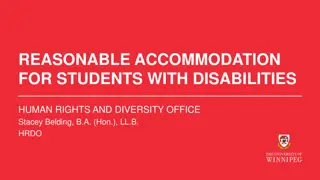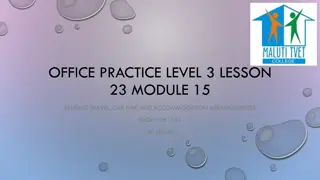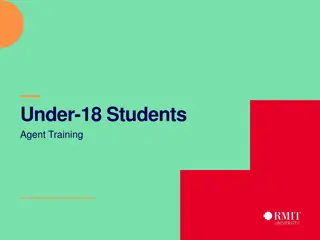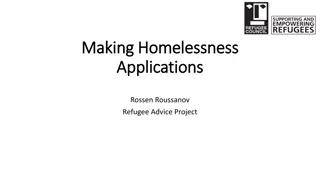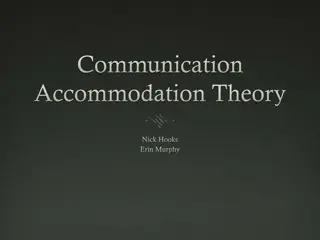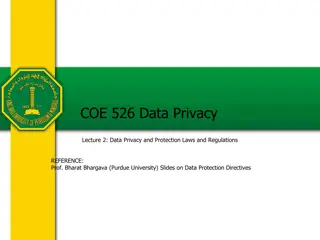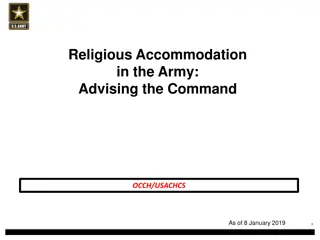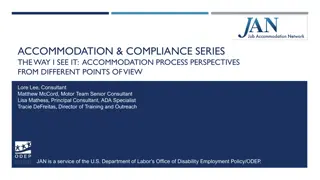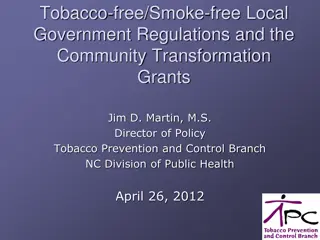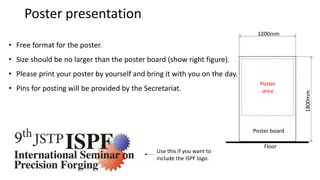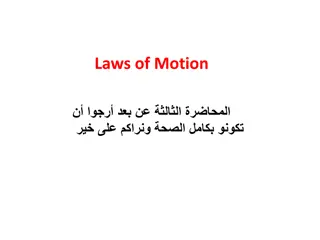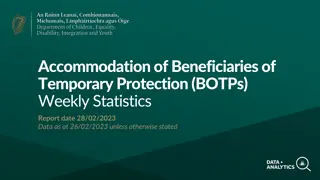Understanding Public Accommodation Laws and Government Regulations
Explore the significance of public accommodation laws in addressing discrimination and government regulations in overseeing business operations. Learn about the police power held by state governments and its implications for how businesses interact with customers and employees. Discover why government intervention is crucial to prevent discrimination against customers in public spaces.
- Public Accommodation Laws
- Government Regulation
- Police Power
- Discrimination Prevention
- Customer Rights
Download Presentation

Please find below an Image/Link to download the presentation.
The content on the website is provided AS IS for your information and personal use only. It may not be sold, licensed, or shared on other websites without obtaining consent from the author. Download presentation by click this link. If you encounter any issues during the download, it is possible that the publisher has removed the file from their server.
E N D
Presentation Transcript
Constitutional Foundations MASTERPIECE CAKE SHOP V. COLORADO
Public Accommodation Laws: GOVERNMENT S EFFORT TO ADDRESS DISCRIMINATION
State governments possess the police power: The ability to legislate on behalf of the people s health, safety and well-being.
Included in the Police Power: Government Regulation of Business
Some dont like regulation, but one of the costs of doing business is the acceptance of government regulation: How a business treats the employees The impact the business has on the environment
The police power CAN ALSO APPLY TO HOW CUSTOMERS ARE TREATED BY A BUSINESS
Public accommodations laws prohibit discrimination against customers.
MO Rev Stat 213.065 (2015) 1. All persons within the jurisdiction of the state of Missouri are free and equal and shall be entitled to the full and equal use and enjoyment within this state of any place of public accommodation, as hereinafter defined, without discrimination or segregation on the grounds of race, color, religion, national origin, sex, ancestry, or disability.
Why should government be able to prohibit discrimination against customers?
The laws of almost every state say: If you are going to open your doors to the public, then you cannot discriminate against those who want to come into your business and purchase your goods and services.
Most Public Accommodation Laws Prohibit Discrimination Based Upon: RACE GENDER NATIONAL ORIGIN RELIGION DISABILITY
Almost half of the states have extended PUBLIC ACCOMMODATION LAWS TO PROTECT INDIVIDUALS BASED UPON THEIR SEXUAL ORIENTATION.
However, laws must not violate the Constitution. If a law, even one as important as a public accommodation law, violated the constitutional rights of a business owner, then it is questionable whether the law would pass constitutional muster.
Does this mean I can do anything I want in the name of my religion?
In the Nineteenth Century, Congress banned polygamy in the western territories A MORMON NAMED REYNOLDS ARGUED THAT HIS RELIGION REQUIRED THAT HE HAVE MULTIPLE WIVES
In Reynolds v. U.S. (1878), the Supreme Court ruled: The First Amendment protects all religious beliefs, but not all actions. Can a man excuse his practices to the contrary because of his religious belief? To permit this would be to make the professed doctrines of religious belief superior to the law of the land, and in effect permit every citizen to become a law unto himself. Government could exist only in name under such circumstances.
Wisconsin law required students to attend school until age 16. Yoder, an Amish father, argued this law was contrary to his religious beliefs. The Amish believed in taking their children out of school after the eighth grade. Secondary education was seen as impermissible exposure to worldly influences that conflicts with their beliefs.
In Wisconsin v. Yoder (1972), the U.S. Supreme Court ruled: Enforcement of the state s requirement of compulsory formal education after eighth grade would gravely endanger if not destroy the free exercise of respondents religious beliefs. Compulsory education laws were enacted to help children to grow into self-supporting adults and to allow them to gain the knowledge that would empower them to discharge the responsibilities of citizenship. These objectives were accomplished in Amish society without having to obey Wisconsin s compulsory education law.
Al Smith belonged to the Native American Church in Oregon The sacrament in his church was peyote, an hallucinogenic substance derived from cactus. It was also criminalized by the state as a controlled substance, a felony. Smith argued that the ingestion of peyote was protected by the Free Exercise Clause, regardless of what the criminal law stated.
In Employment Division v. Smith (1990), the U.S. Supreme Court ruled: The right of free exercise does not relive an individual of the obligation to comply with a valid and neutral law of general applicability on the ground that the law prescribes conduct that his religion proscribes.
After Smith, no matter how much a law burdens religious practices, it is constitutional if The law does not single out religious behavior for punishment The law was not motivated by a desire to interfere with religion
While the Free Exercise Clause seems at first to offer significant protection to the individual, the reality is that the Court s interpretation provides it surprisingly little weight.
Why is Free Speech Important?
Why is Freedom of Speech Important? Democracy Truth Autonomy The expression of ideas is essential for our governmental system to function. Oliver Wendell Holmes said the First Amendment creates a marketplace of ideas, in which everyone can participate. Freedom of speech allows individuals to experience fulfillment by sharing ideas and viewpoints.
What forms does speech take?
What forms does speech take?
Can conduct be considered speech? In 1984, Gregory Johnson burned an American flag at the Republican National Convention to protest the policies of Ronald Reagan.
Johnson argued that his burning of the flag constituted speech. THE SUPREME COURT OF THE UNITED STATES AGREED.
In Texas v. Johnson (1989), the Supreme Court ruled: In deciding whether particular conduct possesses sufficient communicative elements to bring the First Amendment into play, we have asked whether "[a]n intent to convey a particularized message was present, and [whether] the likelihood was great that the message would be understood by those who viewed it."
In Texas v. Johnson (1989), the Supreme Court ruled: Johnson burned an American flag as part - - indeed, as the culmination -- of a political demonstration that coincided with the convening of the Republican Party and its renomination of Ronald Reagan for President. The expressive, overtly political nature of this conduct was both intentional and overwhelmingly apparent.
A final issue: Can the government, consistent with the First Amendment, compel the people to express an idea?
In the 1940s, the West Virginia Board of Education established a rule that all children in public school were required to stand, salute the flag and recite the Pledge of Allegiance.
The Supreme Court ruled that this violated Freedom of Speech in West Virginia v. Barnette (1943) If there is any fixed star in our constitutional constellation, it is that no official, high or petty, can prescribe what shall be orthodox in politics, nationalism, religion, or other matters of opinion, or force citizens to confess by word or act their faith therein.
The Supreme Court ruled that this violated Freedom of Speech in West Virginia v. Barnette (1943) We think the action of the local authorities in compelling the flag salute and pledge transcends constitutional limitations on their power, and invades the sphere of intellect and spirit which it is the purpose of the First Amendment to our Constitution to reserve from all official control.
New Hampshire law required cars to have license plates embossed with the motto, Live Free or Die. The Maynards, residents of New Hampshire, objected to this motto for religious, ethical and moral reasons. They covered the motto on their vehicles with tape. This was a misdemeanor and Dr. Maynard spent 15 days in jail.
In Wooley v. Maynard (1977), the Supreme Court ruled: Here, as in Barnette, we are faced with a state measure which forces an individual, as part of his daily life -- indeed, constantly while his automobile is in public view -- to be an instrument for fostering public adherence to an ideological point of view he finds unacceptable.
In Wooley v. Maynard (1977), the Supreme Court ruled: The First Amendment protects the right of individuals to hold a point of view different from the majority, and to refuse to foster, in the way New Hampshire commands, an idea they find morally objectionable.
